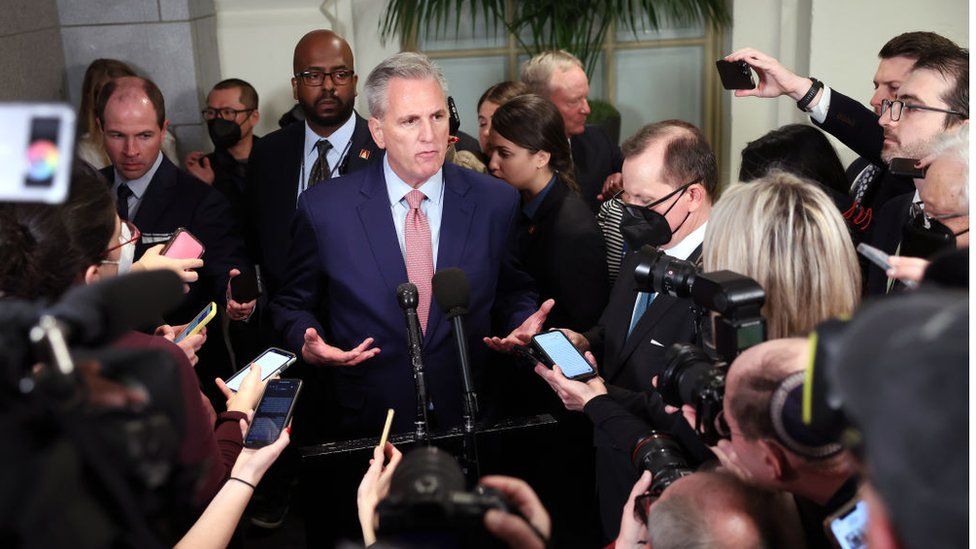ARTICLE AD BOX
 Image source, Getty Images
Image source, Getty Images
Republican Kevin McCarthy has lost a first-round vote to become the next Speaker of the House of Representatives, the first time a nominee has been defeated in a century.
This does not immediately end his candidacy - he may yet prevail in subsequent rounds of voting.
Or he could see his dream of leading Congress' lower chamber destroyed as another contender emerges.
The California representative needs at least 218 votes to win.
There are only 222 Republicans in the chamber this year so Mr McCarthy could only afford to lose four votes from his party. In the first round, he got just 203 votes as 19 Republicans refused to back him.
All 212 Democrats voted for their party leader, Representative Hakeem Jeffries of New York.
What comes next?
The House will keep voting for speaker until a candidate is elected. The chamber cannot proceed with any other business until they have chosen a speaker. That includes swearing in new members of Congress, and adopting new rules and legislations.
It's not yet clear how many rounds of balloting it will take for members to decide today's contest. The process could take the rest of the day, or even continue for several days if no consensus is reached.
The last time a candidate for speaker failed to secure the necessary votes on the first round of ballots occurred in 1923. It took nine ballots and several days to select a speaker.
Why is McCarthy facing opposition?
Past speakers have faced obstacles coming into a new Congress, but have managed to rally their caucus behind them by the time the official vote arrived. But Mr McCarthy has faced opposition from far-right members of his own party ever since Republicans secured control of the House in last November's midterm elections.
The pack is led by Representative Andy Biggs of Arizona, who has put himself forward as an alternative if long-shot candidate, and Representative Matt Gaetz of Florida, who spent much of the last Congress under the spectre of a federal investigation. Mr Biggs received 10 votes in the first round, while nine Republicans backed other candidates.
The holdouts oppose his speakership on ideological and personal grounds, and have spent weeks negotiating Mr McCarthy to win concessions, such as changes to a procedure to oust a sitting speaker.
Mr McCarthy told his caucus in a closed-door meeting Tuesday morning that he believed as many as 20 Republicans would vote against him on the first round of balloting, Capitol Hill press reported. But he remained confident he would ultimately emerge victorious.

 2 years ago
32
2 years ago
32








 English (US) ·
English (US) ·